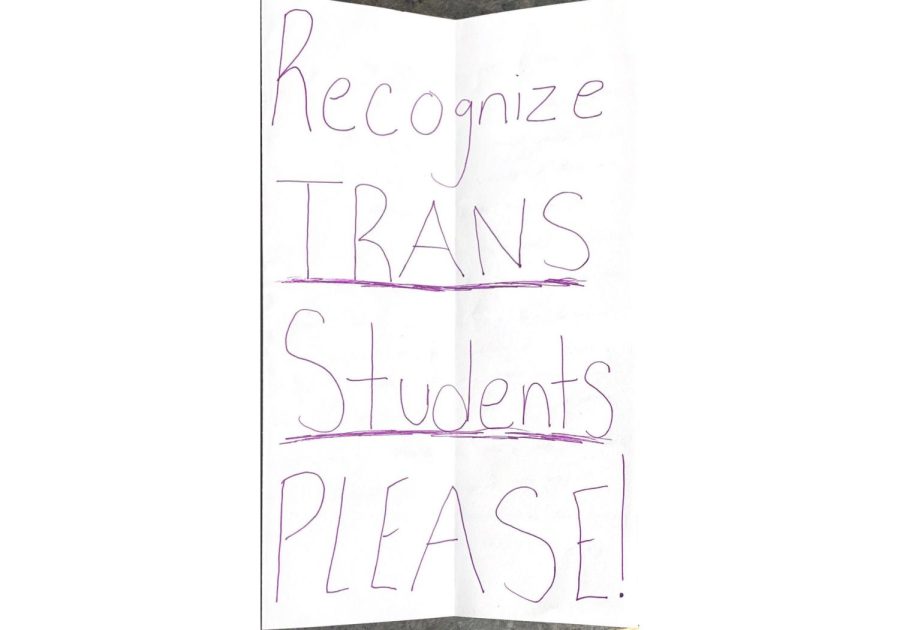Gender-Affirming Care Bans and Their Implications for Trans Youth
Courtesy of anonymous student.
Scan of message from the trans letter writing and zine making event.
Recent political activity has introduced an onslaught of anti-trans legislation, with 11 states passing policies and laws that prohibit minors from receiving gender-affirming care. Currently, at least 20 other states are considering or in the process of placing restrictions on medical care for trans individuals.
Proponents of these bans have argued that gender-affirming care poses a threat to children. Florida State Senator Clay Yarborough argued that government intervention is necessary, comparing sex-reassignment to “mutilation.”
“I filed this legislation because I believe as lawmakers, we do have to draw the line when drastic, life-altering gender dysphoria therapies and surgeries are being prescribed for our children,” Yarborough said.
Washington state currently has protections in place to ensure access to gender-affirming care within state lines under the Gender Affirming Treatment Act. While transgender Washingtonians have a level of lawful protection, the plight of anti-trans rhetoric is felt across state borders.
In response to recent legislation, the Office of Multicultural Affairs (OMA) and Lemieux Library held a Trans Letter Writing event March 30.
Michelle Kim, director of OMA, hoped that the event could serve as a platform for trans students on campus to communicate with the Seattle University community.
“I believe in the power of storytelling and the transformative impact personal narratives can have on people,” Kim said. “I hope that by reading the words written by our trans students and their experience in classrooms and on-campus, those of us in positions of power and influence will be forced to reflect and adjust.”
Sam Grande, a third-year film and media studies major, is OMA’s student gender and sexuality programming assistant. Grande hosted the Trans Day of Visibility event, and is responsible for the campus-wide distribution of letters as well as incident reporting. As part of the event, Grande wrote a letter addressed to all the UCOR professors she has encountered in her college career.
“Dear any UCOR professor I’ve had since my college career, STOP MISGENDERING AND DEADNAMING TRANS AND NONBINARY STUDENTS,” Grande wrote.
Another student felt that the on-campus health center lacks resources for trans students.
“The health center would be much more helpful and inclusive if there was a way to assist in the transition process,” the student wrote. “Having individuals that are experienced in dealing with trans people and can assist with things like hormone therapy and providing resources for surgical options would be super beneficial.”
In a zine, a form of art that combines text and images, one student responded to the notion that transgender identities are confusing to cisgender people.
“I’m sorry if it’s confusing. Sorry is the only word I say that you seem to understand. The wisdom born by my brown, trans flesh is spoken in words your gods are still trying to comprehend,” the student wrote.
The trans letter writing and zine making event served as a place for trans students and allies to raise concerns about accessibility and inclusion.
Elizabeth Dale, an associate professor in nonprofit leadership, has spent her career pursuing philanthropic endeavors, often looking to support LGBTQ+ persons. For students wanting to take action amidst the recent bans, she suggested considering different avenues of support.
“Can you fundraise? Can you volunteer somewhere? How can you advocate and amplify messages of support, safety and acceptance?” Dale said.
As Washington is not currently debating any gender-affirming care bans, Dale acknowledged a lack of state-based channels for action to take place but hoped that students would look to nonprofit organizations in order to use their voices in an advantageous manner.
“If you’re a Washington voter and a Washington citizen, you might not feel like there is a lot you can do with your voting power, but nonprofits can be an outlet to channel your anger regarding legislation into something more productive.”
Dale recommends that students looking to support the transgender community involve themselves with local organizations such as Lifelong, Lambert House and the Pride Foundation.
As anti-trans legislation begins to permeate American politics, the act of creating safe spaces for trans and non-binary individuals falls on non-legislative bodies. Students in search of political action can look to local and nationwide organizations that rally alongside trans communities as well as serving as a pillar of support for trans individuals in their own communities.


